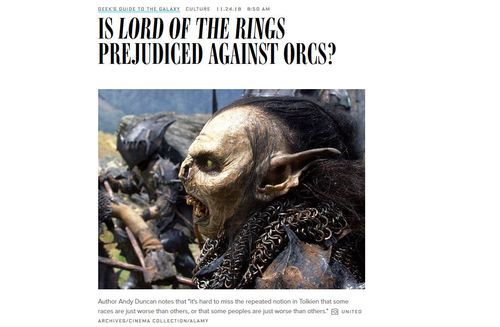


11/25/2018
[See Also: You Can't Make This Stuff Up, etc: "Anti-Racists" Say Lord of the Rings too "Eurocentric" by Sam Francis, February 19, 2004]
The Lord of the Rings, as many posters on /tv and others would likely admit, could never be made again. Partially this is because everything today is constructed via green screens and computer generated special effects. Yet it’s more because LOTR was made at perhaps the last time casting, atmosphere, cinematography, and the overall aesthetic of a film were ranked above the narrative advanced by it. Social Justice Warriors simply did not have the influence over culture and media they way they do today, and journalists were not as fanatical about narrative policing.
Yet even then, as Sam Francis observed all the way back in 2004, some critics (including the SPLC) were calling the films and J.R.R. Tolkein’s work "racist."
At the time, even the respectable right mocked this. As Jonah Goldberg noted in 2003:
One is tempted to ask who is the real racist here? On the one hand we have people — like me — who see horrific, flesh-eating, dull-witted creatures with jagged feral teeth, venomous mouths, pointed devilish ears, and reptilian skin, and say, “Cool, Orcs!” On the other hand we have people, like Mr. Yatt, who see the same repugnant creatures and righteously exclaim “black people!” Maybe he should spend less time vetting movies for signs of racism and more time vetting himself if, that is, he free-associates black people with these subhuman monsters.
[Movies & Metaphors, National Review, January 3, 2003]
However, the goalposts have shifted in the years since. Now, it’s not that Tolkien was somehow equating the evil creatures he had invented with black people. It was that he was actually racist against orcs themselves; that is, he was guilty of racism against the creatures he invented for a fantasy novel.
FANTASY AUTHOR ANDY Duncan was inspired to write his story “Senator Bilbo” after noticing that the segregationist senator Theodore Bilbo shares a name with J.R.R. Tolkien‘s hobbit hero Bilbo Baggins.
“‘Senator Bilbo’ is this parody in which you have this racist demagogue stomping around the world of the halflings, in a sort of desperate holding pattern to keep at bay all the change that is coming about as a result of what seems to have been the War of the Ring,” Duncan says in Episode 336 of the Geek’s Guide to the Galaxy podcast.
The story, which appears in Duncan’s new collection An Agent of Utopia, was also inspired by Michael Moorcock, who has criticized Tolkien for depicting creatures such as orcs, trolls, and goblins as intrinsically evil.
“It’s hard to miss the repeated notion in Tolkien that some races are just worse than others, or that some peoples are just worse than others,” Duncan says. “And this seems to me — in the long term, if you embrace this too much — it has dire consequences for yourself and for society.”
“Senator Bilbo” first appeared in 2001, but its references to border walls and a “Shire First” policy make it seem more relevant than ever.
[Is Lord of the Rings Prejudiced Against Orcs?, Wired, November 24, 2018]
Most pop culture today is entirely derivative. It mostly consists of thinking of new ways to call what superior people created problematic and racist. So Duncan’s rent seeking isn’t exactly uncommon. But it’s worth noting that:
1) Yes, the orcs were inherently evil and were a product of evil
2) The hobbits in the LOTR books did rebel against change coming to the Shire because they returned to find their people enslaved even after the Ring was destroyed
3) The whole point of the Shire was that it was an idealized representation of the rural England that was being destroyed by industrialization

If there was one thing that our society embraces today "too much," it’s not that "some races are just worse than others," it’s that races and peoples are completely interchangeable and that simply having people migrate in unlimited numbers has no negative consequences. No one actually believes this in their own personal life, as shown by where most people choose to live, send their kids to school, or associate with. But for some reason, we elevate a nonsensical idea to the status of a moral commandment, and now we build crappy derivative fiction on top of it.
True culture is rooted in something organic and real, which is why LOTR was so meaningful to so many people.
As Sam Francis observed:
The fact is that "Lord of the Rings" is an important, beautiful and entirely healthy movie, more or less faithfully based on an important, beautiful and entirely healthy book, which itself draws from some of the deepest springs of Western culture — the myths and folklore of Northern Europe — and tells an important, beautiful and entirely healthy story that white Western men need to hear.
No wonder they hate it.